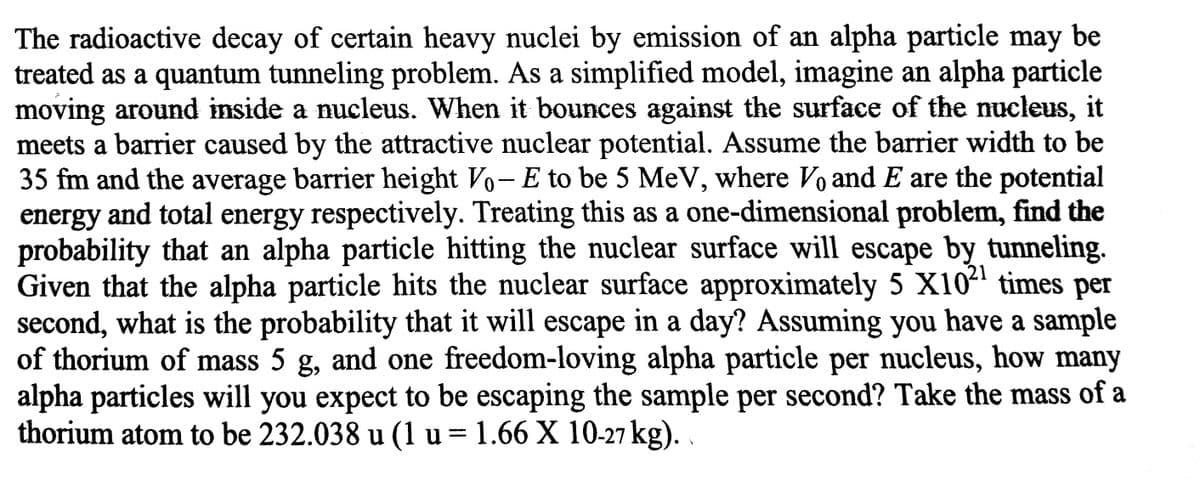The radioactive decay of certain heavy nuclei by emission of an alpha particle may be treated as a quantum tunneling problem. As a simplified model, imagine an alpha particle moving around inside a nucleus. When it bounces against the surface of the nucleus, it meets a barrier caused by the attractive nuclear potential. Assume the barrier width to be 35 fm and the average barrier height Vo- E to be 5 MeV, where Vo and E are the potential energy and total energy respectively. Treating this as a one-dimensional problem, find the probability that an alpha particle hitting the nuclear surface will escape by tunneling. Given that the alpha particle hits the nuclear surface approximately 5 X10ª times per second, what is the probability that it will escape in a day? Assuming you have a sample of thorium of mass 5 g, and one freedom-loving alpha particle per nucleus, how many alpha particles will you expect to be escaping the sample per second? Take the mass of a thorium atom to be 232.038 u (1 u = 1.66 X 10-27 kg). .
The radioactive decay of certain heavy nuclei by emission of an alpha particle may be treated as a quantum tunneling problem. As a simplified model, imagine an alpha particle moving around inside a nucleus. When it bounces against the surface of the nucleus, it meets a barrier caused by the attractive nuclear potential. Assume the barrier width to be 35 fm and the average barrier height Vo- E to be 5 MeV, where Vo and E are the potential energy and total energy respectively. Treating this as a one-dimensional problem, find the probability that an alpha particle hitting the nuclear surface will escape by tunneling. Given that the alpha particle hits the nuclear surface approximately 5 X10ª times per second, what is the probability that it will escape in a day? Assuming you have a sample of thorium of mass 5 g, and one freedom-loving alpha particle per nucleus, how many alpha particles will you expect to be escaping the sample per second? Take the mass of a thorium atom to be 232.038 u (1 u = 1.66 X 10-27 kg). .
Related questions
Question
Explain each step plz

Transcribed Image Text:The radioactive decay of certain heavy nuclei by emission of an alpha particle may be
treated as a quantum tunneling problem. As a simplified model, imagine an alpha particle
moving around inside a nucleus. When it bounces against the surface of the ucleus, it
meets a barrier caused by the attractive nuclear potential. Assume the barrier width to be
35 fm and the average barrier height Vo-E to be 5 MeV, where Vo and E are the potential
energy and total energy respectively. Treating this as a one-dimensional problem, find the
probability that an alpha particle hitting the nuclear surface will escape by tunneling.
Given that the alpha particle hits the nuclear surface approximately 5 X104 times per
second, what is the probability that it will escape in a day? Assuming you have a sample
of thorium of mass 5 g, and one freedom-loving alpha particle per nucleus, how many
alpha particles will you expect to be escaping the sample per second? Take the mass of a
thorium atom to be 232.038 u (1 u = 1.66 X 10-27 kg).
21
%3D
Expert Solution
This question has been solved!
Explore an expertly crafted, step-by-step solution for a thorough understanding of key concepts.
This is a popular solution!
Trending now
This is a popular solution!
Step by step
Solved in 3 steps
